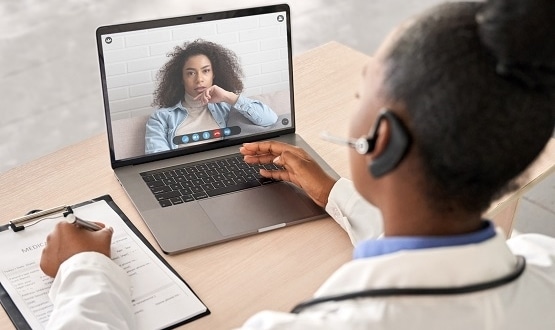Another view: Of problems with primary care IT
- 28 November 2018

Neil Paul and his colleagues have had just about enough of primary care IT problems, with infrastructure and software alike causing headaches. So why – our GP columnist asks – is focus being placed on non-fundamental features and his STP talking about potentially cutting primary care IT investment?
“I just can’t stand it anymore”: that’s one of my partner colleagues said to me the other day after a week of particularly bad IT. I tend to agree with her, as we’ve not had a good time with IT lately.
WannaCry hit us hard. The news might have been all about the hospitals it attacked but our primary care infrastructure was severely hit. At the time there were a lot of meetings and a lot of fuss about improving the system and working out what went wrong and about how to improve our security. Yet I’m not sure much came out of it other than us being given McAfee antivirus.
Now this seems to have caused more trouble than it’s worth. On starting up your PC, it can now take eight minutes to get to the log in window. Apparently that’s due to the antivirus triple checking everything.
Of course, our machines are old. They are on Windows 7. They have little memory, yet we increasingly have multiple applications open. I can be running eight to 10 pieces of software at any one time, and I suspect some don’t support older operating systems properly – in exactly the same way as modern websites don’t work on old browsers. We have been promised new machines but I’m not holding my breath. I also worry that by the time they have been sent out they will be out of date.
Overzealous security
McAfee appears to not only stop bad software, but in fact to stop anything. We tried installing and being an early adopter of the primary care communications solution AccuRx. For weeks we couldn’t get it to work. It turned out to be the antivirus. Recently Vision installed their population health software on a server in my building, so I could take a look at it. Everything was fine until we couldn’t get the client to work. The problem? Again, the antivirus software.
Perhaps this overzealous security is the price we have to pay for reduced risk of cyberattack. But I’ve been told there are alternatives that aren’t as bad and I’m eagerly waiting to try them.
The challenges we’re experiencing don’t just relate to McAfee, though. We recently upgraded to Docman 10, which manages clinical correspondence. Personally I think the UI could use some work: it’s too easy to click on the wrong thing and not that straightforward in places. However, I suspect that my perception has been coloured by the internet issues we’ve experienced, and which have meant on several occasions I’ve not been able to view the letters about a patient I am seeing.
We complained and complained and eventually we were told the local DNS nameserver wasn’t working correctly. It was losing the connection to the cloud server and causing errors. This was fixed, and things got slightly better but still things would grind to a halt.
In-depth analysis showed our internet pipe isn’t big enough. We have 25,000 patients, 60 plus staff, a whole host of attached and community colleagues, and frankly when we are all online it maxes out. Apparently when a community nurse synced her Outlook calendar it maxed out the connection and stopped anyone else doing anything. We are currently awaiting an upgrade.
But even when it is upgraded, I’m not convinced all our problems will be solved. The NHS N3 internet gateway appears to be flaky. We use Lexacom Cloud for our digital dictation. It’s great but it’s not on N3 (which is being replaced, nationally, by the Health and Social Care Network – HSCN). Lexacom Cloud relies on the internet connection. Apparently, it’s been going wrong recently. No one appears to know when it will be fixed, but hundreds of practices are affected.
Why-can’t-I-connect-fi?
We are thinking of putting in a separate broadband connection. Of course we will have to get the local routers to cope. I worry no one will be able to program them given how bad our wifi is.
The other day I joined my MacBook to the NHS staff wifi – it worked fine. I then tried connecting my iPhone. It used to work. It no longer does. The friendly local IT help guy tried a few things; nothing worked. I finally reported it formally, to be told 24 hours later to be told that smartphones aren’t supported and to try 4G or NHS Guest instead.
I suspect the wifi isn’t working properly but they don’t know how to fix it. I’m not the only one who finds the wifi flaky. You can be under one of the access points and you can’t detect the signal, yet at the other end of the building its fine. In some buildings it works fine in others you appear to have to reboot your machine forget the network and rejoin. (And rebooting is not a fun proposition when your antivirus software means it takes eight minutes to get from reset to login.)
But it’s not just the infrastructure that’s an issue. At my wife’s practice, the rollout of an patch to EMIS resulted in the software crashing every time they put in a problem title or printed a prescription – processes that happen in mot consultations. Turns out her practice is an early patch adopter despite never asking to be. It took two days to fix.
Internal messaging problems have long been an issue in EMIS. We have issues with tasks not being deleted. There are also random crashes that don’t help, though some of these might be more the above infrastructure issues.
EMIS Remote Consultation – the new flagship enterprise cross practice system –worked really well in testing. Then we used it with the fist patient and it didn’t work. We think we’ve fixed it. Meanwhile EMIS recently issued an emergency message informing us that double clicking in Workflow Manager might inadvertently close multiple tasks, and to therefore be careful. Not great if an accidentally-closed task was important or clinically relevant.
Meanwhile, OptimiseRx – a medicines optimisation software that runs alongside EMIS – seems to want me to click and click multiple times to get it to do anything.
Oh, and NHS Mail webmail appeared to stop working for a while today.
Just before I went home, we were told to leave our machines on as suspicious activity had been detected on the network and they wanted to run antivirus overnight. Given the antivirus is running all the time it puzzles me what good this will do, but I’ve almost given up asking.
Let’s get the basics right, shall we?
Some might say it’s the nature of delivering an IT system that things will go wrong. But I wonder about whether we have the right skills, expertise and enough money to buy what we need. People often talk about planes not flying if something goes wrong on them. Yet with all the problems above, we never shut nor turned away one patient – despite potentially giving poor care and putting ourselves at risk of being sued. The IT people don’t get the complaints that my practice manager has to deal with.
I also worry that amid all this talk of AI and online services we aren’t fixing the fundamental issues, and instead planning to spend money on speculated benefits rather than the basics. Let’s get some safe, secure, fast internet links in. Let’s give everyone a decent high spec machine that works.
I recently saw a local STP document that basically said the big plan was to stop investing in primary care IT, arguing it had been over-invested in and that hospitals needed more money. But 90% of care happens in primary care and, as our experiences show, it is definitely not a time to cut investment.





16 Comments
“Let’s get the basics right” should be the mission statement of everyone involved in NHS IT from Matt Hancock down to newly appointed trainees. If Matt Hancock realised how stretched and antiquated basic IT services are in some parts of the NHS he might focus more attention on getting the basics right – essential if the Digital agenda is ever going to be delivered and the associated benefits realised. I’d make an analogy with the road network, if it wasn’t for all the potholes and traffic congestion we suffer on the roads!
We could start by having an honest and independent audit of clinical digital maturity and IT service levels across the whole NHS, including primary and community care.
CDMI was launched just over 5 years ago but was undermined by the emphasis on self-assessment … can you imagine NHS Finances being governed on a self-assessment basis? I’ve lost count of the number of people, especially clinicians, who have poured scorn on the CDMI scores of their own and neighbouring organisations. The reality they experience seems disconnected to the picture painted by CDMI.
The root causes of the situation described by Paul are doubtless varied but, if his experience is typical, we need to collectively ask how the heck did Primary Care IT regress so much in the past 15 years?
Brilliant reality check Paul. I went to Oslo last week to meet Margunn Aanestad author of “Working with the Installed base” http://www.worldcat.org/title/information-infrastructures-within-european-health-care-working-with-the-installed-base/oclc/987616634 which I thoroughly recommend , free to download. The GP IT “installed base” looks pretty scary right now and another Wannacry looks inevitable unless we can get the basics right.
Why not? Why aren’t you forwarding each and every complaint to them, if necessary copying them to the CCG’s CCIO? (And the CCG’s CEO if that doesn;t work?)
This is gloves off time: if NHS IT frequently doesn’t work in the global way you;ve described, then make sure heads start to roll. Otherwise, what’s the point of spending any money at all on IT? If it doesn’t work; or doesn’t work reliably; or is far to slow to work with then we all need to be creating a stink — and even refusing completely to work with it.
Does this sound OTT? – actually, no. If we all ‘cope’ under such ridiculous pressure, then those in charge get the message that we will always cope, so they don’t have to bother themselves with sorting it out. But if the powers that be know that the systems they have commissioned are in a total mess, and that the clinicians are refusing point blank to work with them, that will bring them up hard against the problem that they have created for themselves.
Sorry, my earlier comment was supposed to have a quote from the article at its head, but it didn’t get printed out. The quote was :-
‘The IT people don’t get the complaints that my practice manager has to deal with.’
have you ever tried reporting anything to the helpdesk? it would just double or triple the time. in a previous article i a little tongue in cheek – suggested we had an icon on our desktops that a user could click whenever anything went wrong. just count the number and from where. and when. at the moment the time it takes to report something inhibits reporting things.. though personally i kind of agree with you – one of my commonest comments to colleagues is… have you reported it….
A mini update – my iPhone joined the NHS staff wifi in my building the other day despite me being told it wasn’t supported or allowed. Not sure anyone had done anything different – it just seemed to work this time… hardly inspiring. However last night I was at a meeting in Burton in a GP surgery – tried to join their NHS wifi.. as the 3g signal was so bad (no 4G at all) After finding the network it took me to a landing page – only it didnt load – after about 8 mins I gave up. so i guess its not just my local IT support
of course it hasn’t been reported, wouldn’t want the IT Folk taking a look and suggesting my streaming Netflix or the reception staff on social media was the cause of the problem!
East Cheshire Trust has had excellent results replacing the old legacy hard drives with solid state drives. At a fraction of the cost of replacing the PC, the boot time has reduced from over 10 minutes to under 2 minutes. All discs arrive pre-imaged by the supplier to the Trust’s build; so its simply requires switching out the old an in with the new with instant results. Highly recommended for use with Windows 7 32bit devices.
hi Torin – that’s useful to know thanks!
Blackpool Teaching Hospitals NHS Foundation Trust has also spent the last year upgrading the majority of the existing PC’s (Hospital and Primary Care) to Windows 10 using Solid State Disks and 8GB RAM, and this has dramatically improved the overall speed and efficiency of machines…highly recommended!
this might be a bit geeky but a friend tells me – hes stunned that someone hasnt produced a custom PC for NHS desktops – small form factor – on board M2 – NVME SSD with os and just enough hard disk space for local – gigabit ethernet or faster with bluetooth – to allow connection to wireless devices.
No need really – most major IT suppliers already make these. HP for example. All-in-one PCs have the same footprint as most displays. The NHS just lacks the imagination to move away from large form factor boxes!
Speaking as a fellow ICT professional working in the NHS I’d absolutely agree with KP and politely suggest that the fact we are still discussing the effects of Wannacry 18 months after the event says an awful lot in itself. All the anti-virus available wouldn’t alone have stopped an infection on 12th May 2017. Having up to date and properly managed infrastructure would have done. We do have the necessary skills and expertise but to make a real difference we need to be allowed to use them, both in terms of being able to influence strategy and how the limited funding available is put to best use. It may well be different in other areas but locally STP/DTB/HSLI boards who decide strategy and where the money will be spent have exactly zero representation from ICT professionals with any form of technical background – the NHS is the only “business” I’ve been involved in where this can happen and I’d say the results often speak for themselves.
As an NHS IT Professional (and also a patient in Dr Paul’s local CCG area), this is a really sad situation. Throwing a new antivirus solution in sounds like a knee-jerk reaction to wannacry and it doesn’t sound like the fundamental infrastructure issues have been addressed.
The basic infrastructure of any IT environment is the foundation and critical to everything else working, unfortunately it isn’t as attractive to the people holding budgets as a new app or a shiny mobile device. At the same time infrastructure doesn’t have to be expensive, it just needs to be simple, secure and well designed. Unfortunately the design is usually done by 3rd party companies for profit selling the latest and greatest over complicated/spec’d solution that requires an expensive ongoing support contracts, and not by employing properly skilled and qualified professionals in the NHS.
I think Dr Paul hits the nail on the head when he wonders if we have the right skills and expertise for what is needed, as for money I think we have that but it is not always being well spent.
I don’t normally have things to say about your articles but I always look forward to reading them. I like to hear about real problems and issues without them being filtered by the process.
Great article Paul. A absolute reality check for policy makers out there.
Comments are closed.